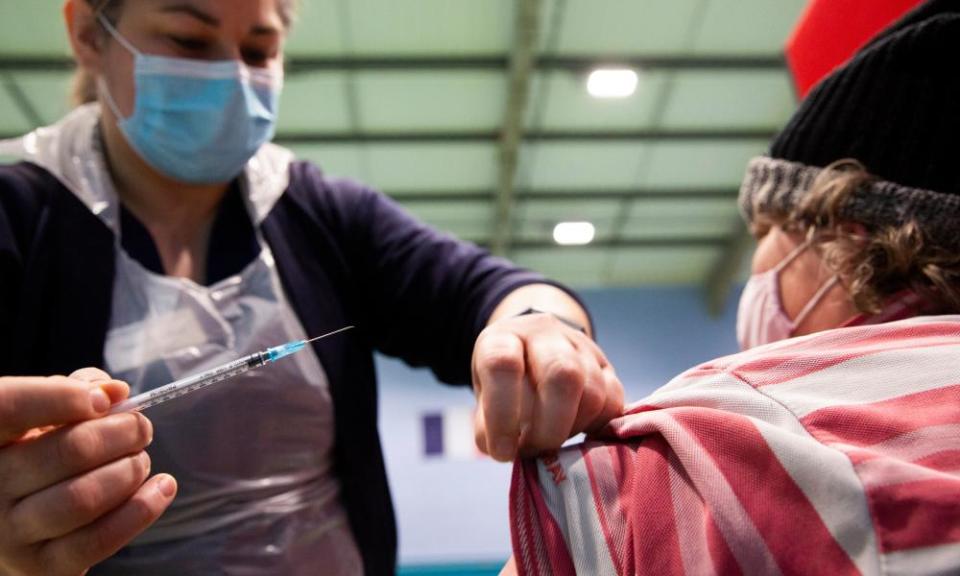Coronavirus: unions criticise UK's age-based vaccine approach

Unions representing police, prison officers and teachers have expressed dismay at the decision to base the next stage of the coronavirus vaccination programme purely on age, with no account taken for people’s profession.
The recommendation of the Joint Committee on Vaccination and Immunisation (JCVI), endorsed by the government, means people over 40 will be the next group to be prioritised once those in phase 1 of the rollout, aimed at older and more vulnerable people, have been offered at least one dose of the vaccine.
Vaccination will then proceed down the age groups, with those aged 30-39 next in line, followed by everyone aged 18-29. The timetable is to complete phase 1 by the end of April, with all adults offered at least one dose by the end of July.
The JCVI said the evidence suggested an age-based approach was the most effective way of reducing deaths and hospital admissions.
But the decision is a blow to unions representing frontline staff, with the Police Federation of England and Wales calling it “an utter betrayal of police officers”.
John Apter, the chair of the federation, said: “The very nature of policing is unpredictable and means my colleagues often cannot socially distance.
“Many officers are reporting sick or self-isolating and our numbers are falling, sometimes dangerously low. We have also lost a number of colleagues to this virus, too. Yet the government continue to hide behind the science of the JCVI. What about a moral duty to my colleagues and their families?”
default
Geoff Barton, the general secretary of the Association of School and College Leaders, said the move was a particular blow ahead of the full return of pupils to schools in England from 8 March.
He said: “This is important not only in reassuring staff who it expects to work in busy and crowded environments, but also in terms of minimising disruption to education caused by staff absence as a result of Covid.”
Mick Pimblett, the assistant general secretary of the Prison Officers Association, said he was “absolutely disappointed”, and that he had hoped members would be prioritised, given their role in a closed, confined environment.
Basing it purely on age in this circumstance made no sense, he said: “Some prison officers will be supervising prisoners receiving the vaccine from healthcare departments, and while the prisoner will get the vaccine the prison officer won’t be.”
Asked about the unions’ response, Boris Johnson’s spokesman said the prime minister had “immense gratitude” for frontline workers, adding: “The JCVI, as an independent organisation, has been clear about the way to carry out vaccinations for this phase, and it’s that that we are going to follow.”
Equality groups had also called for people from black, Asian and minority ethnic communities to be prioritised, as they are more likely to die from coronavirus.
The JCVI said targeting occupational groups would be more complex to deliver and might slow down the vaccine programme, leaving some more vulnerable people at higher risk unvaccinated for longer. Modelling studies have indicated that speed of vaccine deployment is the most important factor in maximising public health benefits against severe outcomes, they said.
“The age-based approach will ensure more people are protected more quickly. It is crucial that those at higher risk – including men and BAME communities – are encouraged to take the vaccine, and that local health systems are fully engaged and reaching out to underserved communities to ensure they can access the vaccine,” said Dr Mary Ramsay, the head of immunisation at Public Health England (PHE).
default
Prof Wei Shen Lim, the Covid-19 chair for JCVI, added: “Vaccinations stop people from dying and the current strategy is to prioritise those who are more likely to have severe outcomes and die from Covid-19.
“The evidence is clear that the risk of hospitalisation and death increases with age. The vaccination programme is a huge success and continuing the age-based rollout will provide the greatest benefit in the shortest time, including to those in occupations at a higher risk of exposure.
“Following an age-based programme will be simple, and simplicity has been one of the cornerstones of the current programme in terms of speed and its success.”
He said an occupation-based vaccine programme had never been tested before on a large scale in the UK, and that there were difficulties associated with it, such as people’s occupations not necessarily being recorded in their health records.
“Trying to switch from an age-based programme to an occupation-based programme would be more complex and potentially introduce more delays into the programme. Speed is the critical factor here,” he said.
“If we went down the route of restructuring the programme by occupation we would run the risk of missing some people because not all occupations are well documented, and we don’t really know all of the occupations that are at risk. We might be able to identify some occupations that are at higher risk, but there will be other people in other occupations where we may miss them.”

 Yahoo Finance
Yahoo Finance 